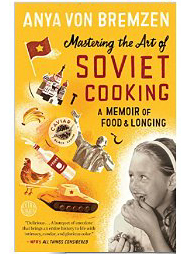 Mastering the Art of Soviet Cooking: A Memoir of Food and Longing by Anya Von Bremzen. Crown Publishers: NY 2013.
Mastering the Art of Soviet Cooking: A Memoir of Food and Longing by Anya Von Bremzen. Crown Publishers: NY 2013.
Let’s begin with a few basic facts.
1. While we have grocery stores in the US, citizens in the Former Soviet Union have for decades waited in endless lines trying to “procure” food.
2. As Anya Von Bremzen states, “Inevitably, a story about Soviet food is a chronicle of longing, of unrequited desire.” (p.2)
Since we just completed two Passover seders, I must pose the question -- why is Anya Von Bremzen’s memoir different than all previous memoirs?
Other writers may be eloquent or witty, but this author is both. I love the comparison of her Mom’s dream life to black and white movies from Stalinist times “sleek cold war thrillers laced with KGB spooks; melodramas starring duty-crushed lovers.”
Second, because this is a shared memoir of Anya and her 79 year-old mother, Larissa, we gain the points of view of two generations. Larissa does not get sucked into cheerleading and gratitude to Stalin for her “happy childhood” as do so many others. She is an early dissident and Alla, one of the two women featured in our book, Jewish Luck, would be jealous that Anya’s mother would not permit her to go to summer camp and had her skip school the day of the Young Pioneer Induction.
Third, the premise is entirely original (to me at least), and it works perfectly. Anya and her mother are preparing a dinner party for each decade of twentieth century life in Russia/USSR/Former Soviet Union that is emblematic of that period. Not only are we in the kitchen with the two women eavesdropping about family history and the history of the nation, but we are also able to enjoy the comments of the octogenarian guests and their reflections and arguments as they dine. I should mention that Anya skips the 1940s. Rather than presenting recipes for this decade, she includes a photograph of the ration card for bread commemorating the Siege of Leningrad and the hardships of war.
Her research transcends family lore to reveal some little known historical facts. For example, two of Russia’s best-loved foods – the chocolate covered ice cream bar and the kotleta were based on ideas imported from the USA. In the 1940’s Stalin’s appointed Commissar of the Food Industry, Anastas Mikoyan, was sent to the United States for a coast-to-coast tour of food processing plants to revolutionize the industry in the USSR. Apparently, hamburgers and Eskimo pies were two items that Mikoyan enjoyed although, as Von Bremzen reports, the bun was lost in translation.
On a more serious note, Anya Von Bremzen, covers the tragic events of this century and the very poorly calculated moves of Lenin and Stalin, which resulted in millions dying of starvation.
Anya shares many of the same childhood memories as Alla and Vera in Jewish Luck. Her kindergarten experience and her communal living experience parallel Alla and Vera’s. She also provides a textured cultural history that contextualizes those experiences.
“Bolshevism has abolished private life.” Von Bremzen quotes German philosopher/writer, Walter Benjamin (p.39). Indeed, that was the shared experience of Alla, Vera and Anya Von Bremzen in their childhood communal apartments. She reports that in the early days of Communism, the allowance was for nine square meters per person. Women were to be liberated from the kitchen by the establishment of communal cafeterias, which were reputedly awful.
The child of a Jewish mom and Russian dad, Anya Von Bremzen left Russia before having to make a choice at age sixteen which nationality she would enter on line five of her passport. Vera and Alla did not have that choice. Von Bremzen includes the Communists’ relabeling of Judaism as a nationality versus a religion. Ending with a Passover note, she stated during the years when a Soviet haggadah was published, the words “October Revolution” substituted for God (p. 47).
Mastering the Art of Soviet Cooking is not a cookbook, but, as the subtitle promises, truly “A Memoir of Food and Longing” sweeping an entire century of life in the Former Soviet Union and speaking to the hunger for a decent life.
Molodetz*, Anya Von Bremzen.
*Molodetz – Russian for “well done” or “yashar koah”!